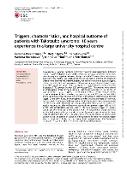Triggers, characteristics, and hospital outcome of patients with Takotsubo syndrome: 10 years experience in a large university hospital centre

Autor
Poledníková, Karolína
Datum vydání
2023Publikováno v
European Heart Journal: SupplementsRočník / Číslo vydání
25 (Suppl. E)ISBN / ISSN
ISSN: 1520-765XInformace o financování
UK/COOP/COOP
MSM//LX22NPO5104
UK/UNCE/MED/UNCE/MED/002
Metadata
Zobrazit celý záznamKolekce
Tato publikace má vydavatelskou verzi s DOI 10.1093/eurheartjsupp/suad105
Abstrakt
A unique clinical feature of Takotsubo syndrome (TTS) is the stress trigger factor. Different types of triggers exist, generally divided into emotional and physical stressor. The aim was to create long-term registry of all consecutive patients with TTS across all disciplines in our large university hospital. We enrolled patients on the basis of meeting the diagnostic criteria of the international InterTAK Registry. We aimed to determine type of triggers, clinical characteristics, and outcome of TTS patients during 10 years period. In our prospective, academic, single centre registry, we enrolled 155 consecutive patients with diagnoses of TTS between October 2013 and October 2022. The patients were divided into three groups, those having unknown (n = 32; 20.6%), emotional (n = 42; 27.1%), or physical (n = 81; 52.3%) triggers. Clinical characteristics, cardiac enzyme levels, echocardiographic findings, including ejection fraction, and TTS type did not differ among the groups. Chest pain was less common in the group of patients with a physical trigger. On the other hand, arrhythmogenic disorders such as prolonged QT intervals, cardiac arrest requiring defibrillation, and atrial fibrillation were more common among the TTS patients with unknown triggers compared with the other groups. The highest in-hospital mortality was observed between patients having physical trigger (16% vs. 3.1% in TTS with emotional trigger and 4.8% in TTS with unknown trigger; P = 0.060). Conclusion: More than half of the patients with TTS diagnosed in a large university hospital had a physical trigger as a stress factor. An essential part of caring for these types of patients is the correct identification of TTS in the context of severe other conditions and the absence of typical cardiac symptoms. Patients with physical trigger have a significantly higher risk of acute heart complications. Interdisciplinary cooperation is essential in the treatment of patients with this diagnosis.
Klíčová slova
Prolonged QTc intervals, Stress, Takotsubo Registry, Takotsubo syndrome, Trigger mechanism
Trvalý odkaz
https://hdl.handle.net/20.500.14178/1924Licence
Licence pro užití plného textu výsledku: Creative Commons Uveďte původ-Neužívejte dílo komerčně 4.0 International







